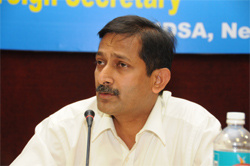You are here
The second session focused on ‘Towards Stability in Pakistan and Afghanistan’. Chaired by Amb. Yash Sinha, Joint Secretary (Pakistan, Afghanistan and Iran), in the Ministry of External Affairs, the session had two presentations, the first by Brig. Ben Barry of IISS and the second by Dr. Ashok Behuria of IDSA.
 Brig. Ben Barry gave a military perspective on the topic. He argued that the American decision to withdraw troops from Afghanistan will result in the Afghan forces gradually taking charge of security. The Afghan army has grown in size and capabilities and is likely to expand to 350,000 and will eventually take full control of the country’s security after 2014. At a time when air power superiority is decisive in Afghanistan, NATO has succeeded in bringing down insurgent attacks in the country by as much as eight per cent from the previous year. Although there has been military progress and an improvement in the security situation in southern Afghanistan, the situation remains a matter of concern in the south eastern part of the country especially in the area across the Durand Line and in the outskirts of Kabul where the Haqqani militant network is pretty strong and active. Although a significant improvement can be seen in improving the efficiency of the Afghan army, the same cannot be said of the Afghan police. Further, the country lacks key developed institutions in the form of courts, lawyers and prisons. In the near future, the Afghan army and police will reach their full strength and be capable of holding southern Afghanistan on their own without any external assistance. This part of the region is now relatively free from insurgency. However, eastern Afghanistan and the lawless hinterland around Kabul will remain under the insurgent sway in the near future. As far as Pakistan is concerned, its punitive action against the Haqqani network leaves a lot to be desired. It seems that, for Pakistan, the objective is to try and block India’s role in the region. Moreover, its deteriorating relationship with the US has further compounded the problem. It does not appear that Pakistan has the political or the economic will to sincerely act against the Haqqani network in North Waziristan.
Brig. Ben Barry gave a military perspective on the topic. He argued that the American decision to withdraw troops from Afghanistan will result in the Afghan forces gradually taking charge of security. The Afghan army has grown in size and capabilities and is likely to expand to 350,000 and will eventually take full control of the country’s security after 2014. At a time when air power superiority is decisive in Afghanistan, NATO has succeeded in bringing down insurgent attacks in the country by as much as eight per cent from the previous year. Although there has been military progress and an improvement in the security situation in southern Afghanistan, the situation remains a matter of concern in the south eastern part of the country especially in the area across the Durand Line and in the outskirts of Kabul where the Haqqani militant network is pretty strong and active. Although a significant improvement can be seen in improving the efficiency of the Afghan army, the same cannot be said of the Afghan police. Further, the country lacks key developed institutions in the form of courts, lawyers and prisons. In the near future, the Afghan army and police will reach their full strength and be capable of holding southern Afghanistan on their own without any external assistance. This part of the region is now relatively free from insurgency. However, eastern Afghanistan and the lawless hinterland around Kabul will remain under the insurgent sway in the near future. As far as Pakistan is concerned, its punitive action against the Haqqani network leaves a lot to be desired. It seems that, for Pakistan, the objective is to try and block India’s role in the region. Moreover, its deteriorating relationship with the US has further compounded the problem. It does not appear that Pakistan has the political or the economic will to sincerely act against the Haqqani network in North Waziristan.
 Dr. Ashok Behuria argued that in 2014 when the Americans leave Afghanistan, the warlords, ethnic leaders and different local groups will try to assert their influence in a fractured society. At the recent Loya Jirga Assembly, it was unanimously held that the interests of all the groups had to be protected. A disturbing trend has been observed wherein the Taliban is trying to reach out to the local population without diluting its ideology. Therefore, key policies of the Taliban remain the same which does not bode well for the future. The future of the Afghanistan-Pakistan (AfPak) region will depend on the strategic choices that Pakistan makes. There is a very distinct possibility that Pakistan will come in the way of attaining regional stability in Afghanistan. Therefore, the time has come for the international community to force the Pakistan army to make the right strategic choices. Afghanistan is in dire need of fresh investment not just in meeting its security requirements (weapons modernization, etc.) but also in building the much needed critical infrastructure. In order to bring normalcy to Pakistan, socio-political transformation is a must given the clear divide between the civilian leadership and the omnipresent army. Till the time terrorist haven and sanctuaries are removed in Pakistan, it will be difficult to have a complete pullout of Western troops from Afghanistan. Pakistani army will never want any kind of Indian foothold in Afghanistan. As long as Pakistan tries to define itself through India it will be very difficult to find any solution to bring about stability in the region. India, for its part, has contributed through small-budget, high-impact projects which have been very well received by the people of Afghanistan. India has also opened tracks of communication but the road ahead is long and extremely difficult.
Dr. Ashok Behuria argued that in 2014 when the Americans leave Afghanistan, the warlords, ethnic leaders and different local groups will try to assert their influence in a fractured society. At the recent Loya Jirga Assembly, it was unanimously held that the interests of all the groups had to be protected. A disturbing trend has been observed wherein the Taliban is trying to reach out to the local population without diluting its ideology. Therefore, key policies of the Taliban remain the same which does not bode well for the future. The future of the Afghanistan-Pakistan (AfPak) region will depend on the strategic choices that Pakistan makes. There is a very distinct possibility that Pakistan will come in the way of attaining regional stability in Afghanistan. Therefore, the time has come for the international community to force the Pakistan army to make the right strategic choices. Afghanistan is in dire need of fresh investment not just in meeting its security requirements (weapons modernization, etc.) but also in building the much needed critical infrastructure. In order to bring normalcy to Pakistan, socio-political transformation is a must given the clear divide between the civilian leadership and the omnipresent army. Till the time terrorist haven and sanctuaries are removed in Pakistan, it will be difficult to have a complete pullout of Western troops from Afghanistan. Pakistani army will never want any kind of Indian foothold in Afghanistan. As long as Pakistan tries to define itself through India it will be very difficult to find any solution to bring about stability in the region. India, for its part, has contributed through small-budget, high-impact projects which have been very well received by the people of Afghanistan. India has also opened tracks of communication but the road ahead is long and extremely difficult.
During the subsequent discussion, several important points were raised and suggestions were made. It is necessary to ensure regional and international cooperation to bring about stability in the region. Many roadblocks lie in the way to achieve even moderate success. However, the recent India-Pakistan Commerce Secretary level talks have given a ray of hope. The civilian leadership must play a more prominent role in Pakistan and confidence building measures need to be built amongst the stakeholders especially in political, economic and security fields. Regional cooperation and better connectivity would increase the chances for success on account of all countries being involved as part of the inclusive process. It would be difficult for India to directly talk with the military in Pakistan since that would legitimize the military structure. Track II diplomacy needs to be emphasized and attempt is being made to have periodic interactions with the members of India’s and Pakistan’s National Defence Colleges. Dialogue is the best way to achieve stability in Afghanistan.
